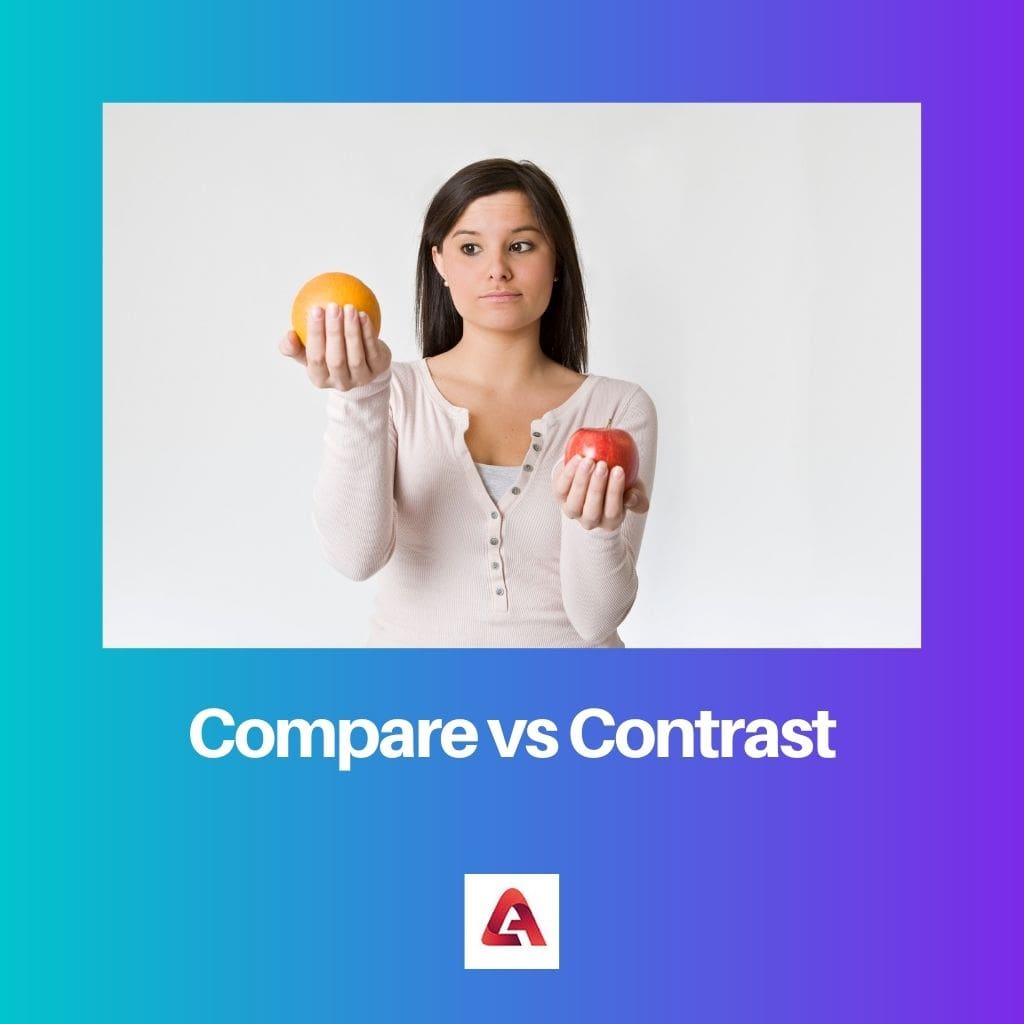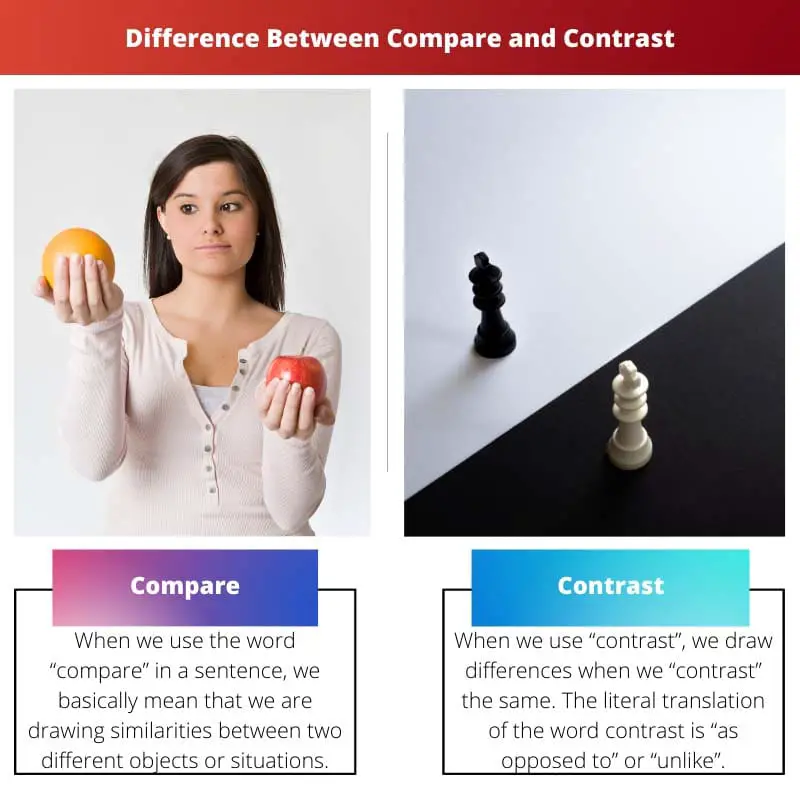While language helps us get clarity on a particular subject, it can sometimes be equally confusing.
We get confused with words having almost similar meanings, but if we dig deeper, there’s a huge gap separating both words. Two such words added to the vocabulary of the English language are: Compare and Contrast.
Key Takeaways
- To compare means to examine the similarities or differences between two or more items, ideas, or concepts, highlighting the commonalities or distinctions between them.
- Contrast refers to identifying and emphasizing the differences between two or more items, ideas, or concepts, focusing on their distinctions.
- Comparing and contrasting are analytical processes used to evaluate and understand relationships between items or ideas. Still, comparing can involve examining similarities and differences, while contrast focuses exclusively on the differences.
Compare vs Contrast
The difference between Compare and Contrast is that while we draw similarities when we “compare” two objects, we draw differences when we “contrast” the same.

When we use the word “compare” in a sentence, we mean that we draw similarities between two objects or situations.
We are here weighing the consequences of these objects or situations carrying similarities that may or may not be visible.
For example, if you compare a person living in India with someone living in Bangladesh, you are here deducing the coincidences of similarity.
You are considering the characteristics of both these people and forming an opinion or coming to a desirable conclusion. This weighing of characteristics of two different situations or objects can be called comparing.
Coming to the word “contrast”, the situation is quite the opposite here. While we draw similarities when we “compare” two objects/situations, we draw differences when we “contrast” the same.
The literal translation of the word contrast is “as opposed to” or “unlike”. The primary version of the word contrast is ” contrary”.
If you have to highlight the difference(s) between two given situations or objects, you may begin your sentence with “Contrary to…” or “In contrast of…. Contrast underlines the characteristic(s) which segregate the situations or objects.
Comparison Table
| Parameters of Comparison | Compare | Contrast |
|---|---|---|
| Definition | When we use the word “compare” in a sentence, we mean that we draw similarities between two objects or situations. | When we use “contrast”, we draw differences when we “contrast” the same. The literal translation of the word contrast is “as opposed to” or “unlike”. |
| Characteristic | Draws parallels between two situations. | Draws differences between two situations. |
| Verb form | I was comparing, In comparison to, etc. | Contrary to, In contrast with, etc. |
| Example | To compare is to weigh consequences. | To contrast is to underline the differences. |
| Synonyms | Verb form: Weighing, matching, conduct, etc. | Verb form: To juxtapose, unlike, as opposed to, etc. |
What does “Compare” mean?
Sometimes we incur a situation where we are expected to analyse two objects or circumstances and weigh their respective characteristics to conclude.
This drawing parallels or weighing two ideas can be called comparing (the verb form of ‘compare’). Let’s understand this more clearly through easy examples.
Suppose a person wants to vacation and is confused between Shimla and Darjeeling. Here, he/she will start comparing the characteristics of these places and the pros and cons of these places.
Both places are cold, but Shimla is colder. Both places have marvellous hills, but the mountains in Shimla are steeper.
This is how you “compare” the characteristics of two different situations and see the pros and cons of the situation.
In this manner, you compare or weigh the essentialities of two different or almost similar situations or things. You introspect and deduce your analogies of a given situation. This act of introspecting situations can be called comparing.

What does “Contrast” mean?
Regarding the word “contrast”, the situation is quite the opposite here.
While we deduce similarities when we “compare” two different situations/objects or almost similar situations/objects, we deduce differences when we “contrast” the same.
Let’s take an easy example here to get a clearer perspective; when two people debate over an issue, one begins his/her statement with “Contrary to what my fellow debater said” this directly the opposition reflected by the debater.
The word “contrary” means as opposed to. Unlike in “comparison”, there is no space to pick out similarities from the situations at hand; you only highlight what makes them stand apart and what separates them from each other.
If you have to highlight the difference(s) between two given situations or objects, you may begin your sentence with “Contrary to…” or “In contrast of…. Contrast underlines the characteristic(s) which segregate the situations or objects.

Main Differences Between Compare and Contrast
- In ‘compare’, when we use the word “compare” in a sentence, we mean that we draw similarities between two objects or situations. In contrast, we draw differences when we “contrast” the same. The literal translation of the word contrast is “as opposed to” or “unlike”.
- ‘Compare’ draws parallels between two situations. While ‘contrast’ draws differences between the two situations.
- The verb form of ‘compare’ is comparing, In comparison to, etc. The verb form of ‘contrast’ is contrary to, In contrast with, etc.
- Example of ‘compare’: “To compare is to weigh the consequences”. Example of ‘contrast’: “To contrast is to underline the differences”.
- Synonyms for the verb form of “comparing”: Weighing, matching, conduct, etc. Synonyms for verb form of “contrast”: To juxtapose, unlike, as opposed to, etc.



